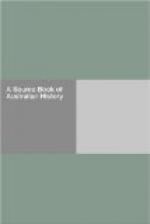Between October 28 and November 5 the first Australian contingents sailed amidst the most enthusiastic popular demonstrations. They were officered and manned almost entirely by members of the various colonial volunteer forces, and thus possessed the advantage of a certain amount of initial training which was destined to stand them in good stead in the field. It should never be forgotten that their success was mainly due to the persistent effort of those officers, whether Imperial or colonial, who during the past twenty years had given their services to the development and organization of the colonial forces. It was the existence of these forces that kept up the military spirit in the colonies.
Small as was the force contributed by the Empire (nearly 80,000 men) it was none the less a material assistance, whose value can hardly be overrated. It practically doubled the mounted force, and thus made possible those sweeping movements by which Lord Roberts reached Pretoria. Above all, it gave the Imperial Government a moral support which enabled it to face with equanimity the almost universal hostility of the European powers or the fanatical outcries of a few anti-Imperialist partisans at home. Never, probably, in modern times has there been a greater consensus of honest opinion in support of a great national movement than that which backed up Britain’s effort to maintain her position in South Africa. It was simply that the free citizens of free countries asked to be allowed to venture their lives for the sake of a political ideal which was personally and intimately dear to each one of them, and that, in spite of the paralysing absence of either precedent or preparation, many thousands actually achieved their desire. The war has not shown what the Empire can do, but it has revealed to those who perhaps doubted before, what an Empire we can make if we but choose.
ELANDS RIVER
Amongst varying fortunes and many indecisive actions, the defence of the position at Elands River stands out as an achievement only made possible by courage and grim determination.




